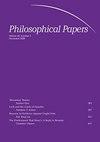灭绝时代的审美慰藉
IF 1.3
3区 哲学
0 PHILOSOPHY
引用次数: 0
摘要
摘要鉴于人类目前对生物圈施加的环境压力,有压倒性的证据表明,我们已经进入了重大灭绝事件的早期阶段。事实上,一些科学家担心这次灭绝事件会严重到构成地球第六次大灭绝。作为一个物种,我们最紧迫的责任是尽我们所能防止这种灭绝的发生。但我想在这里探讨的问题是,如果我们失败了,我们的哲学反应应该是什么?根据乔治·哈里斯对悲惨损失的描述,我认为,虽然我们应该正确地将人为灭绝视为道德悲剧和悲伤的原因,但我们不应该认为它是绝望的原因。原因是,我们可以从生活几乎肯定会以新的、不可预测的方式恢复和重新多样化的知识中获得美学安慰。亚当·斯密对系统之美和崇高性的见解尤其重要,它表明了地球生物圈如何仍然是美学价值的载体,即使面对我们正在造成的(暂时但长期的)破坏。本文章由计算机程序翻译,如有差异,请以英文原文为准。
Aesthetic Consolation in an Age of Extinction
Abstract In light of the environmental pressure humans are currently placing on the biosphere, there is overwhelming evidence to think that we have entered the early stages of a major extinction event. Indeed, some scientists worry this extinction event will be so bad as to constitute Earth’s sixth mass extinction. Our most pressing responsibility as a species is to do everything in our power to prevent such an extinction from occurring. But the question I wish to pursue here is, what should our philosophical response be if we fail? Drawing on George Harris’ account of tragic loss, I argue that, while we should rightly consider an anthropogenic extinction a moral tragedy and cause for grief, we should not consider it cause for despair. The reason is that we can take aesthetic consolation from the knowledge that life will almost certainly recover and re-diversify in new and unpredictable ways. Adam Smith’s insights into the beauty and sublimity of systems is particularly relevant in showing how Earth’s biosphere remains a bearer of aesthetic value, even in the face of the (temporary, though long-term) damage we are causing it.
求助全文
通过发布文献求助,成功后即可免费获取论文全文。
去求助
来源期刊

Philosophical Papers
PHILOSOPHY-
CiteScore
2.10
自引率
0.00%
发文量
18
期刊介绍:
Philosophical Papers is an international, generalist journal of philosophy edited in South Africa Original Articles: Articles appearing in regular issues are original, high-quality, and stand-alone, and are written for the general professional philosopher. Submissions are welcome in any area of philosophy and undergo a process of peer review based on initial editor screening and refereeing by (usually) two referees. Special Issues: Topic-based special issues are comprised of both invited and submitted papers selected by guest editors. Recent special issues have included ''Philosophy''s Therapeutic Potential'' (2014, editor Dylan Futter); ''Aging and the Elderly'' (2012, editors Tom Martin and Samantha Vice); ''The Problem of the Criterion'' (2011, editor Mark Nelson); ''Retributive Emotions'' (2010, editor Lucy Allais); ‘Rape and its Meaning/s’ (2009, editor Louise du Toit). Calls for papers for upcoming special issues can be found here. Ideas for future special issues are welcome.
 求助内容:
求助内容: 应助结果提醒方式:
应助结果提醒方式:


